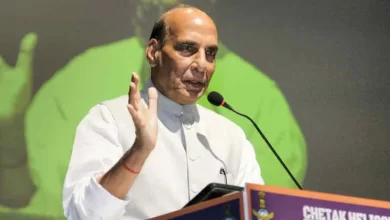Rishi Sunak set to unveil multi-billion pound defence spending boost

Rishi Sunak is expected to announce a significant boost in defence spending on a visit to the US next weekend.
It has been reported that the Prime Minister will announce a multi-billion pound spending increase during the visit, which comes just days before Jeremy Hunt’s Budget on March 15.
Government sources did not deny the claims, first reported by The Sunday Times.
During the two-day visit, Mr Sunak will hold talks with Joe Biden and Anthony Albanese, the US president and Australian prime minister respectively, to discuss the three countries’ Aukus nuclear submarine pact.
Ben Wallace, the Defence Secretary, has been pushing for an increase of between £8 billion and £10 billion to fulfil spending commitments, keep pace with inflation and meet higher levels of funding for Nato and Ukraine.
While the increase expected to be announced by Mr Sunak is set to be significant, it is not thought to be as high as this.
Aukus nuclear pact talks
According to recent reports, Mr Sunak, Mr Biden and Mr Albanese are expected to use their summit in the US to discuss their preferred submarine design for Australia’s replacement fleet.
The three nations are sharing classified military capabilities to allow Australia to construct and deploy new nuclear-powered submarines in the Pacific region in place of its ageing equipment.
Aukus was set up to counter Chinese military power in the Pacific. Its launch in September 2021 resulted in Australia cancelling a £47 billion deal to buy 12 French diesel-electric submarines in favour of more sophisticated nuclear-powered submarines from Britain and the US.
It also emerged that workers will be given annual health checks as part of a government plan to stem the flow of people going on long-term sick leave and reduce the number of people economically inactive.
The Treasury is expected to use the Budget to launch subsidies to help small and medium-sized enterprises to introduce occupational health services and provide basic “health appraisals”.
Ministers believe that assessments, which could include tests for blood pressure and body mass index, will help to reduce the number of people leaving the labour market by detecting health problems earlier.
The initiative is part of a wider workforce review being carried out by Mel Stride, the Work and Pensions Secretary, to deal with the more than nine million economically inactive people (6.6 million excluding students), including growing numbers of over-50s.
Steve Barclay, the Health Secretary, has given his backing and wants a greater focus on illness prevention, including tackling obesity, to help stop people from developing long-term conditions.
A government source said: “The more we can mobilise employers to do more testing, the quicker we can start to pick up on conditions before employees even know they have got a problem.
“Just like having an annual appraisal, you would have an annual health MoT, which would then be used to direct individuals to the most appropriate place for support.”







